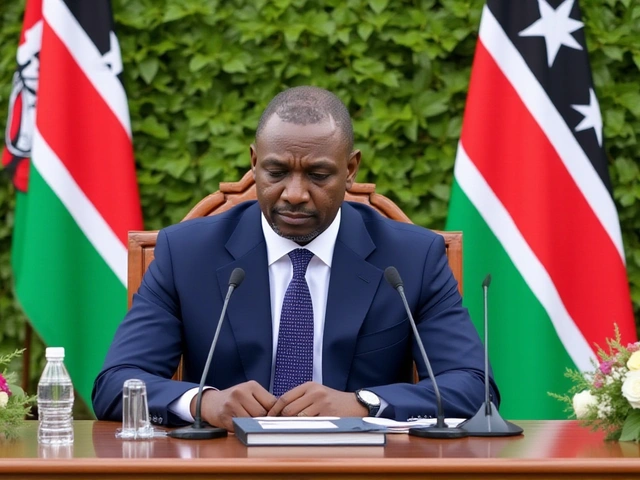Moses Kuria, once a prominent figure in the Kenyan political scene, finds himself navigating uncharted waters after his dismissal from the Cabinet by President William Ruto. In an unexpected twist, Kuria revealed that he was offered a job at a mortuary, an offer he described as both shocking and humiliating given his previous stature in the government. This revelation came to light during a recent political rally where Kuria sought to engage with his supporters and express his viewpoints on the current administration.
Addressing the crowd, Kuria did not hold back his feelings of disbelief and disappointment. He emphasized how inappropriate and degrading the job offer was, considering his extensive experience and former high-ranking position. “Being offered a position at a mortuary is not only an insult to my career but also to the dignity of public service,” Kuria stated emphatically. His emotional discourse struck a chord with many, illustrating the harsh realities faced by those who fall out of favor in the turbulent world of politics.
During his speech, Kuria seized the opportunity to lambast President Ruto's administration. He pointed out various policies and decisions that he believes are steering the country in the wrong direction. From economic missteps to governance issues, Kuria laid bare his critiques, asserting that Ruto's leadership is doing more harm than good to Kenya's progress. His remarks have ignited a broader debate, drawing reactions from political analysts, commentators, and ordinary citizens alike.
The Repercussions of Power Dynamics in Kenyan Politics
Kenya's political landscape has always been characterized by its dynamic and often tumultuous nature. Changes in power can lead to significant shifts in alliances and fortunes for those in public service. Kuria's case vividly illustrates the precarious nature of political appointments and the uncertainty that follows an exit from the limelight. Many former high-ranking officials find it challenging to secure roles that match their previous status, often encountering offers that seem to undermine their past contributions.
The incident involving Kuria is reflective of a broader trend wherein ex-officials struggle to reinvent themselves after their tenure ends. Not everyone manages to transition smoothly into new roles or maintain their influence and relevance. The job offer at the mortuary, while mortifying for Kuria, underscores a harsh truth about the volatility and fragility of political careers. This scenario resonates with a broader audience, as it brings to light the challenges faced by public servants once their term in office concludes.
Kuria’s Continued Efforts to Stay Relevant
Despite his unceremonious dismissal and the subsequent job offer, Kuria is not backing down. His public speeches and relentless criticism of Ruto's policies highlight his determination to stay in the political arena. By vocalizing his discontent and engaging with the public, Kuria is striving to maintain his political relevance and influence. His actions suggest a strategic move to position himself as a vocal opposition voice, rallying support from those disillusioned with the current administration.
The rally where he disclosed the mortuary job offer served as a platform for Kuria to reassert his presence in the political discourse. He painted a picture of an administration that is out of touch with the needs of the people, seeking to galvanize support for his future political endeavors. Kuria’s criticism of Ruto's policies, such as economic strategies and governance issues, finds resonance among sections of the populace who are grappling with the realities of these policy decisions.

The Public's Reaction and the Path Ahead
Kuria's revelations and subsequent criticisms have led to a whirlwind of public debate. On one hand, his supporters see his outspokenness as a courageous stand against a flawed administration. On the other hand, critics argue that Kuria's actions are a desperate bid to cling to political relevance. This division in public opinion highlights the complex dynamics of Kenyan politics, where loyalty and opposition often blur, and personal interests frequently intersect with public narratives.
The path ahead for Kuria remains uncertain yet brimming with potential. His ability to leverage his platform effectively will determine whether he can regain a foothold in the political sphere. By continuing to vocalize his criticisms and engaging with the electorate, Kuria aims to carve out a niche for himself in what is undoubtedly a challenging landscape. The mortuary job offer, while demeaning, has inadvertently provided him with a powerful talking point that underscores the struggles faced by former officials.
The Broader Implications for Public Service in Kenya
Kuria’s experience sheds light on broader issues within Kenya's political and public service sectors. The uncertainty that accompanies a transition out of public office calls for a reflection on how the system can better support former officials. Ensuring dignified transitions and recognizing the contributions of public servants are essential for maintaining the integrity and attractiveness of public service roles. This situation serves as a stark reminder of the need for reforms that provide security and respect for those who have served the nation.
In conclusion, Moses Kuria’s journey from Cabinet Secretary to receiving a mortuary job offer encapsulates the volatility and challenges of political life in Kenya. His story, while specific, resonates with a wider audience grappling with the unpredictable nature of political careers. As Kuria continues his efforts to stay relevant and influence public discourse, his experience underscores the urgent need for systems that honor the contributions of public servants and provide them with meaningful opportunities post-tenure.




This is what happens when you trade principle for power. Kuria was never a servant of the people-he was a parasite in a suit. A mortuary job? Good. Let him handle the dead instead of lying to the living. No dignity in politics anymore, just ego and corruption.
Stop pretending he’s a martyr. He’s just another politician who got caught with his hand in the till and now wants sympathy.
Kenya doesn’t need more drama. It needs accountability. And he’s the last person who should be handing it out.
My heart just broke reading this. Imagine being someone who gave years of your life to public service, only to be treated like garbage when you’re no longer useful.
It’s not just about the mortuary job-it’s about how we treat people who’ve served. We don’t throw away our elders, our teachers, our leaders. We honor them.
Even if we disagree with him, we owe him dignity. That’s what makes us human.
Let’s not turn pain into punchlines. Let’s build systems that protect people after they’ve given everything.
I’m crying for Kenya. We’re losing our soul.
The metaphysical dissonance here is profound. Kuria, once an instrument of state authority, now finds himself at the threshold of mortality’s literal domain-a symbolic inversion of power’s ephemeral nature.
Political office, like all human constructs, is contingent upon the whims of temporal structures. The mortuary offer, however grotesque, is merely the material manifestation of an ontological truth: no man is indispensable.
Yet, the indignity lies not in the job, but in the public spectacle of its disclosure-a performance designed to elicit pity, not reform.
True dignity is not conferred by title, but by the quiet integrity with which one accepts irrelevance. Kuria, in his outrage, reveals his inability to transcend the ego.
Perhaps the real tragedy is not the offer, but the fact that we still measure human worth by position rather than character.
Power is temporary. Respect is earned.
He’s still talking. That’s a win.
Keep going. The people are listening.
Don’t stop. Not now.
Stay loud.
Who gave this man the right to speak for Kenya? He was part of the same corrupt machine that ruined this country.
Now he plays the victim? Pathetic.
A mortuary job? Better than what he deserves.
He helped loot our treasury, now he wants us to cry for him?
Wake up Kenya. This is not a tragedy. This is karma.
He should be scrubbing floors, not giving speeches.
Real leaders don’t beg for attention after they’re fired.
They disappear with dignity. He doesn’t have it.
It is imperative to contextualize this incident within the framework of postcolonial political pathology. The mortuary job offer, while ostensibly an isolated anecdote, is in fact a semiotic rupture in the hegemonic narrative of African political succession.
It is not merely a personal affront to Kuria-it is a systemic indictment of the neocolonial patronage networks that reduce human capital to expendable commodities.
Moreover, the performative outrage exhibited by Kuria is not a sign of moral rectitude but rather a calculated rebranding strategy, leveraging victimhood as a currency in the attention economy.
One must interrogate the source of the alleged offer: Is it corroborated? Is it verifiable? Or is it a rhetorical artifact, deployed to manufacture outrage among his dwindling base?
The lack of documentary evidence renders this episode less a scandal and more a mythos, a narrative constructed to sustain political relevance in an era of digital fragmentation.
What is truly alarming is not the offer itself, but the uncritical reception it has received from a populace increasingly incapable of distinguishing between grievance and propaganda.
Until we institutionalize transparent transitions and decouple political loyalty from personal survival, we will continue to witness these grotesque spectacles masquerading as political discourse.